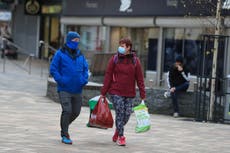UK economy could be 6% smaller than forecast due to tighter Covid restrictions
Resolution Foundation warns recovery is expected to be ‘bumpy ride’
Your support helps us to tell the story
From reproductive rights to climate change to Big Tech, The Independent is on the ground when the story is developing. Whether it's investigating the financials of Elon Musk's pro-Trump PAC or producing our latest documentary, 'The A Word', which shines a light on the American women fighting for reproductive rights, we know how important it is to parse out the facts from the messaging.
At such a critical moment in US history, we need reporters on the ground. Your donation allows us to keep sending journalists to speak to both sides of the story.
The Independent is trusted by Americans across the entire political spectrum. And unlike many other quality news outlets, we choose not to lock Americans out of our reporting and analysis with paywalls. We believe quality journalism should be available to everyone, paid for by those who can afford it.
Your support makes all the difference.The UK economy could be 6 per cent smaller if tougher lockdowns are implemented in the new year to contain the new Covid-19 variant, a think-tank has said.
The Resolution Foundation warned the recovery is expected to be a “bumpy ride” and ministers will need to support the economy for longer than originally planned.
The highly-contagious variant could lead to more robust restrictions, meaning the economy will be smaller by Easter than hoped just a month ago, a report by the think-tank said.
This would mean reducing economic growth for 2021 as a whole from 5.5 to 4.3 per cent.
But with vaccines being rolled out, the analysts expect hospitality spending after April to bounce back "very quickly", in a similar manner to what was witnessed in the US following the influenza pandemic in 1918-19.
However, chief executive Torsten Bell cautioned that "the return of a 'roaring 20s' feel to hospitality does not mean the whole economy will automatically return to full health".
He warned that rising unemployment may mean household incomes fall even during a recovery for gross domestic product (GDP) –a measure of the size of the economy.
The pandemic has seen richer households saving large sums as they stop spending on services, while poorer workers in industries where jobs have been lost resorted to borrowing to cover day-to-day expenses.
The Resolution Foundation anticipates that a possible hospitality boom driven by the more well-off spending their cash when the restrictions ease will not fully solve the economic challenges.
The experts warned that with the end of the furlough scheme, unemployment will rise and incomes will fall.
"And while everyone rightly wants to get back to normal, no-one should think we came through this crisis only to see the better off eating out while poorer families struggle with higher debts," the report said.
A Treasury spokeswoman said: "Our priority is protecting, supporting and creating jobs. That is why, through our plan for jobs, we've invested £280bn to protect millions of jobs and businesses across the UK.
"But our plan goes further than this. We're also creating jobs through our £2bn kickstart scheme, tripling traineeships, incentives for firms hiring apprentices and doubling the number of work coaches, so that nobody is left without hope or opportunity."




Join our commenting forum
Join thought-provoking conversations, follow other Independent readers and see their replies
Comments